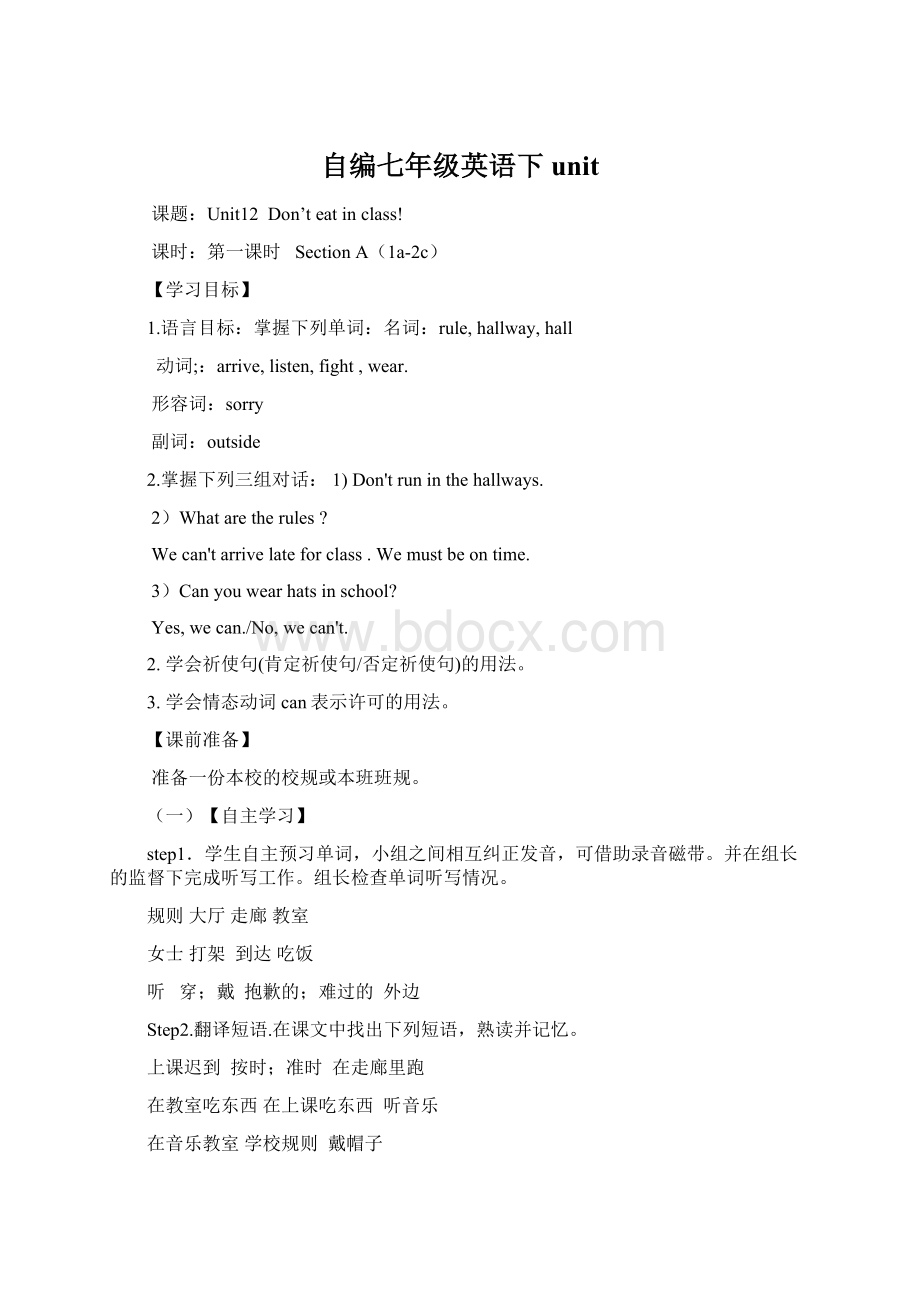自编七年级英语下unitWord文档下载推荐.docx
《自编七年级英语下unitWord文档下载推荐.docx》由会员分享,可在线阅读,更多相关《自编七年级英语下unitWord文档下载推荐.docx(24页珍藏版)》请在冰豆网上搜索。

难过的外边
Step2.翻译短语.在课文中找出下列短语,熟读并记忆。
上课迟到按时;
准时在走廊里跑
在教室吃东西在上课吃东西听音乐
在音乐教室学校规则戴帽子
在外边吃
step3.知识点拨。
根据下面的讲解自学知识点。
(有疑问的地方,请标注出来。
)
①rulen.规则;
规章
常用短语有follow/obeytherules遵守规则;
breaktherules违反规则;
makerules制定规则
·
Wemustobeythetrafficrules.我们必须遵守交通规则。
②arrivev.“到达”。
不及物动词。
如果表示到达某地时,则用arrivein/at,较大的地点用in,较小的地点用at。
TheyarriveinBeijingnow.他们现在到了北京。
Iarriveatthebusstationontime.我准时到达了公共汽车站。
arrivelatefor=belatefor做某事迟到。
arrivelatefor侧重到达的时间晚,belatefor侧重于状态。
Don’tarrivelateforthemeetingnexttime
=Don’tbearrivelateforthemeetingnexttime下次开会别迟到
③辨析ontime与intime
ontime是"
准时;
按时"
之意。
Thetrainpulledinontime.火车准时到站了。
intime有"
及时;
迟早"
的意思,意指正赶上时候或恰在需要的时候,或解释为"
终有一天;
最后"
;
Wewerejustintimefor(或tocatch)thebus.我们及时赶上了公共汽车
④outsideadv.在外面
outside做副词,意为“在外面,外部地”,其反义词是inside"
在里面"
Tomiswaitingforyououtside.汤姆在外面等你。
outside还可做介词,“在......范围之外”。
Let'
smeetoutsidethepark.让我们在公园外见面吧。
⑤辨析listen和hear
listen强调听的动作,意为“听”,后面接宾语时,必须加介词to.
Ilikelistentothemusic.我喜欢听音乐。
hear强调听的结果,意为“听到。
后面直接跟宾语。
Icanhearagirlsinging.我能听到一个女孩正在唱歌。
⑥辨析inclass,intheclass和intheclassroom
inclass在课堂上·
Pleasekeepsilentinclass.课堂上请保持安静。
intheclass在班上·
Heisthemostintelligentboyintheclass.他是班上最聪明的孩子。
intheclassroom"
在教室里"
·
MissLiisintheclassroomnow.李老师现在在教室里。
拓展:
辨析inhospital和inthehospital
inhospital生病住院·
Sheisinhospital.她住院了。
inthe/(a)hospital在医院·
Sheworksinthehospital.她在医院工作。
⑦Ms.Miss.Mrs.和Mr.
Ms.意为“女士”,用于婚姻状况不明的女子或不想区分婚否的女子的姓氏或姓名之前。
Ms.Greenisafamouswriter.格林女士是位著名的作家。
Miss意为“小姐”,用在未婚女子的姓氏或姓名之前。
Miss.ZhangcomesfromShanghai.张小姐来自上海。
Mrs.意为“夫人”,用于已婚女子的姓氏或姓名之前。
Mrs.Whitelikescats.怀特夫人喜欢猫。
Mr.意为“先生”,用在男子的姓名之前。
Mr.Smithworksinamiddleschool.史密斯先生在一所中学上班。
语法
(一)祈使句
祈使句是用来表示请求、命令、建议的句子,其中谓语动词用动词原形,通常省略主语you,句尾用句号或感叹号,朗读时常用降调。
(1)肯定祈使句
①行为动词原形+其他
Openthedoor,please.请开门。
②Be+形容词
Bequiet!
安静!
③Letsb.+动词原形+其他
Let’sgohome.让我们回家吧。
(2)否定祈使句
①Don’tbelateforclass.上课不要迟到。
②No+名词或动名词+其他
Notalking。
不要说话。
注意:
①表示礼貌时,在句首或句尾加please。
Comein,please.请进。
②将称呼放在句首或句尾时,用逗号隔开。
Pleaselistentome,Tom.请听我说,汤姆。
③在句首加do表示强调。
Dobecareful。
一定要小心。
(二)情态动词can的用法
情态动词+动词原形,可用于所有人称和数。
Can的否定式为cannot,其缩写为can’t;
can的过去式为could.
(1)Can表示能力意为“能”;
IcanspeakEnglish.我会讲英语。
否定句:
Ican’tspeakEnglish.
一般疑问句:
CanyouspeakEnglish?
Yes,Ican/No,Ican’t.
特殊疑问句:
Whatcanyoudo?
/WhatcanIdo?
(2)Can表示请求和允许时,意为:
“可以”
CanIopenthedoor?
我可以开门吗?
Theclassisover.Youcangohomenow.下课了,你们现在可以回家了。
4.读1a中的学校规则并翻译。
①Don’tarrivelateforclass.
Youmustbeontime.
②Don’truninthehallways.
Youmusteatinthedininghall.
③Don’teatintheclassrooms.
④Don’tlistentomusicinclass.
⑤Don’tfight.
(2)
【合作探究】
1.看图片完成书中1a。
2.Listeningtime听录音完成书中1b。
①集体3遍
②个体训练(优秀示范,中等提升,弱势跟上)
③听音感受,心理暗示
④群体朗读,分组训练
⑤个别朗读,分角色训练
3.比较Don'
tarrivelateforclass.和Wecan'
tarrivelateforclass.的异同。
4.两人一组编对话,时间三分钟。
eg:
A:
Whataretherulesatyourschool?
B:
Well,wecan’tarrivelateforclass.Wemustbeontime.
5.Listeningtime听录音完成书中2a,2b.
6.根据2a,2b中的内容编对话。
—Canwelistentomusic,Cindy?
—Wecan’tlistentomusicinthehallways,butwecanlistentoitoutside.
7.演一演
两人一组对话表演,S1扮演外校转来新生,S2告知本校校规。
(学生可经过讨论,尽可能多地说出他们想到的校规,也可以求助老师。
(三)
【课堂反馈】
一.根据句意及首字母后汉语提示完成单词。
1.Don'
tstando.Comeinplease.
2.Wecan'
tfinclassroomorathome.
3.Wecan'
tmaketoomuchnoiseinthe(大厅走廊).
4.Therearelotsof(规定)inAlan'
sschool.
5.Thereisabigdining(大厅)inourschool,andweeatlunchthere.
二.用所给的词的适当形式填空。
1.__________(notread)inthesun.
2.Youcan’t(eat)intheclassroom.
3.Don’t(listen)tomusicinthelibrary.
4.You’relateagain.Please(arrive)atschoolontime.
5.Jimlivesfarawayfromhisschool.Heisoftenlatefor(class).
三.单项选择
1. runinthehallways.
A.Can’tB.don’tC.NotD.Doesn’t
2.Don’tlateforschool.
A.arrivedB.arriveC.isD.are
3.—Canwelistentomusichere?
—.
A.Yes,youareB.Yes,youdoC.No,youcan’tD.No,youdon’t
4.Hewaslateclasstoday.
A.toB.onC.fromD.for
5.Afterlunch,myfatherlikeslisteningtheradio.
A.onB.forC.toD.at
(四)
【总结与反思】
1、我的收获:
wordsandexpressions:
Sentences:
2、学习本节后,我能用英语表达。
3、我的易错点:
。
我需要提高的是:
。
课题:
第二课时SectionA(2d-3c)
1.名词:
player,uniform
动词:
haveto,bring
形容词:
important,quiet
2.掌握haveto和must用法
不得不重要的播放机;
运动员
安静的带来校服;
制服
2.翻译短语.在课文中找出下列短语,熟读并记忆。
音乐播放器穿校服安静
在图书馆拍照
step2.知识点拨。
1.playern.播放机;
运动员
musicplayer音乐播放器·
baseballplayer棒球运动员
2.quietadj.安静的
bequiet安静·
keepquiet保持安静
2.辨析take和bring
take拿走,远离说话人的方向·
Takethatbooktotheschool.把那本书带到学校去。
bringv.带来,带到说话人的方向来·
Don'
tforgettobringyourguitar.不要忘记带来你的吉他.
2.haveto“不得不,必须”,可用于各种时态,其后接动词原形。
结构:
主语+haveto+动词原形
It’sdark.Ihavetogohome.天黑了。
我必须回家了。
(一般现在时,主语是第三人称单数时,用hasto;
句子是过去时,用hadto.)
如:
Tomhastopracticetheguitareveryday.汤姆每天必须练习弹吉它。
(2)否定形式:
主语+don'
thaveto+动词原形+其他
Nickdoesn'
thavetowearauniform.尼克不必穿制服。
(3)疑问句:
Do(Does或Did)+主语+haveto+动词原形+其他
Doyouhavetostayathomeonweekends?
周末你必须呆在家里吗?
Yes,Ido./No,Idon'
(4)特殊疑问句:
Whatdoyouhavetodo?
辨析must和haveto
must意思是"
必须"
,它侧重于主观上的必要,没有时态和人称的变化。
Youmustbepolitetoyourteacher.你必须要对老师有礼貌。
haveto意思是"
必须、不得不"
,它侧重于客观上的必要,有时态和人称的变化。
Hehasnomoneywithhim,sohehastoborrowsomemoneytobuyit.
他身上没带钱,所以他不得不借钱买这个东西。
3.熟读2d并翻译本段对话.
4.抄写GrammarFocus并翻译.
(二)
1.两人一组表演2d中的对话。
2.背诵2d,看谁最先完成。
3.完成3a,3b.展示核对答案.
4.完成3C,与全班分享你为你梦想的学校所制定的纪律,大家投票选出最酷的学校。
1.Itisveryitoeatalotofvegetablesandfruitforus.
2.Canyoubthesebookstoourclassroom?
3.Iwanttobuyamusicptolistentomusic.
4.Hisfriend(穿)blackpantsandredT-shirt.
5.Pleasekeep(安静).Myfatherissleeping.
二.用can,can’t,haveto,或hasto填空.
1.Weeatintheclassroom,becauseit’simpolite(不礼貌)toourteachers.
2.IwatchTVafterfinishingmyhomework.
3.Ihavetoomuchhomework.Igotobedlate.
4.Tinalookafter(照顾)hermother.Becausesheisill(生病).
5.Thestudentsreadbooksandmagazinesinthelibrary.Theycan’ttakethemoutside.
三.根据汉语意思完成句子(每空一词).
1.上课不要迟到。
class.
2.他们在学校必须穿校服吗?
Dotheywearatschool?
3.他不必在餐厅吃饭。
Hedoesn’thavetoeat.
4.学生们可以在走廊吃东西吗?
studentsinthehallways?
5.我们在图书馆必须保持安静。
Wehavetointhelibrary.
四.句型转换
1.Icanplaycomputergamesonweekends.(一般疑问句)
_________________________________?
Yes,____________.
2.Hehastowearuniform.(变否定句)
He__________wearuniform.
3.Ihavetowearsneakersforgymclass.(一般疑问句)
_____you________wearsneakersforgymclass?
Yes,I____.
4.Theyhavetowashclothes.(对划线部分提问)____dotheyhave________?
5.Youcan’tgooutonschoolnights.(换一种表达)
_______gooutonschoolnights.
课时:
第三课时SectionB(1a-1d)
1.掌握下列单词:
dish;
night
动词:
practice
介词/连词:
before,after
out
2掌握情态动词can和haveto,must用法
碟;
盘晚上在外,向外
练习在…以前在…之后
外出看朋友做家庭作业练习吉他
洗餐具看电视帮妈妈做早饭打扫房间
在上学期间的晚上放学之后晚饭之前
在晚上每个星期六每天早上上学日
1.dishn.碟;
盘
【复数】dishes【短语】dothedishes洗餐具
【联想】dishn.一道菜;
菜肴
2.nightn.晚上
【短语】atnight在晚上(泛指)goodnight晚安
onschoolnights“在上学期间的晚上”,night前面若有其他词修饰,
表示具体某一天的晚上,介词只能用on
We’llhaveapartyonTuesdaynight.
3.helpv&
n.帮助
做动词讲时,常用结构helpsb.todosth.意为“帮助某人做某事”,
其中,不定式符号to可以省略。
HeoftenhelpsmetostudyEnglish./HeoftenhelpsmestudyEnglish.
他经常帮助我学习英语。
helpsb.withsth.意为“帮助某人做某事”或“在……方面帮助某人”。
有时在上下文意思清楚时,与helpsb.(to)dosth.意思相近。
YoucanhelpmelearnEnglish./YoucanhelpmewithmyEnglish.
你可以帮助我学英语。
4.practice的用法
(1)practicevt.练习,训练,其后跟名词,代词或动名词做宾语
practice+nIoftenpracticemyEnglishinthemorning.我常常在早上练习英语
practice+doingHepracticesplayingthepianoeveryday.他每天练习谈钢琴.
(2)practicen.练习,实践
Playingthepianoneedsalotofpractices.弹钢琴需要多加练习。
1.读并且看图片完成1a。
2.Listeningtime听录音完成书中1b,1c。
3.两人一组根据1b和1c的内容编对话。
—CanDavegooutonschoolnights?
—No,hecan’t.
一.根据句意及首字母或汉语提示完成单词。
1.Hemustgotobed(以前)ninetwelve.
2.Cindycan’tgooutonschooln.
3.ShepEnglisheveryday.
4.Maryoftenhelpshermotherdothed.
5.Ican(做)dinnerbymyself.
二.单项选择
()1.Theclassbeginsatten.Don’t____.
A.lateB.arrivelateC.arriveslate
()2.____youeatinclass?
No,I____.
A.Can,can’tB.Don’t,doC.No,don’t
()3.Helenpracticesguitareveryday.
A.play,/B.playing,theC.toplay,the
()4.Wecan’tgoout____schoolnights.